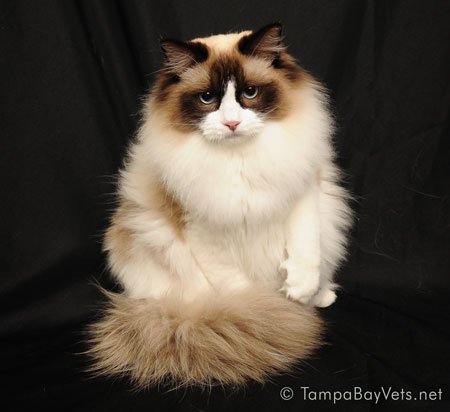Vomiting in Cats is NOT Normal

Occasional hairballs and vomit are a part of every cat owner’s life at one time or another. But vomiting in cats could also be a sign that there may be a problem, such as:
- Poor or low quality diet or treats
- Allergy to an ingredient in their food
- Eating too fast or on a strict schedule
- Enzyme deficiency (Pancreatitis)
- Hairball accumulation
- Poison or toxin ingestion
- Foreign object ingestion
Many pet owners believe that it is ‘normal’ for a cat to vomit. In fact, when we see our feline friends for their semi-annual visits, it is common for clients to never mention it as a concern or problem. In reality, vomiting can be a sign of illness or something very serious. It is your cue that it is time for a visit to the veterinarian.
There are many reasons for a cat to throw up:
One of the Most Common Reasons for Vomiting in Cats is Diet
It’s important if your cat is vomiting regularly to address diet as a central cause. A poor quality, rendered diet could be a contributor. Feeding the same type of protein, even if it’s high quality, can ultimately result in GI inflammation and food allergies. So it’s not just about the quality of the protein, but also about switching proteins frequently.
Treats and Milk as Potential Culprits
Another area to look at is kitty treats. When you look at the label on your cat’s treats and see they contain things like propylene glycol, FDC red #4, ethoxyquin, chemical dyes or emulsifiers, surfactants, and other stuff you can’t pronounce. All those additives, preservatives and just plain junk can cause GI inflammation and vomiting.
Last but not least is milk. Your kitty doesn’t have the enzymes required to break down the milk sugar in cow’s milk – his pancreas doesn’t secrete the lactase necessary to break down the lactose in cow’s milk.
Does Your Cat Gobble Up Every Meal?
If your kitty eats too fast, it can cause regurgitation of undigested food shortly after it’s consumed. Slowing down gobbling will help. You may need to split her meals into smaller portions and feed her more often so the food doesn’t come right back up. If you have more than one kitty, try separating them during feeding time.
The Timing of Meals Makes a Difference
Cats that are fed on a strict schedule may begin to anticipate the next meal in advance – sometimes way in advance. If you are late feeding your cat, there’s a good chance he’ll throw up some white foam and a bit of yellow bile. That’s because the hydrochloric acid irritates his tummy, and since there’s still no food in there for the acid to digest, his body gets rid of some of the acid to avoid further irritation. In this situation it’s best to give your cat a little something to nibble on before you feed her, like a treat or a small portion of her meal.
Enzyme Deficiency Can Cause Vomiting
A cat’s pancreas sometimes doesn’t produce enough lipase, protease, and amylase, which causes chronic or acute pancreatitis. Pancreatitis (inflammation of the pancreas) is very common in kitties. In fact, we’re finding as veterinarians it’s a lot more common than we assumed as the underlying cause of intermittent vomiting. If your cat’s pancreas is not secreting sufficient enzymes, supplementing is a great way to assure she’ll have adequate enzymes to process her meals.
Hairballs Are Another Common Cause of Intermittent Vomiting
Cats with long hair and cats that groom themselves a lot will need some help from you to reduce the amount of hair they are swallowing. Brushing and even shaving down long-hair cats can reduce the amount of hair swallowed. You can also facilitate hair passage through your cat with a bit of fiber added to the diet or a petroleum-free hairball remedy.
Other Reasons Cats Throw Up
Poisoning, unfortunately, is a very common cause of sudden vomiting in kitties. If you have a cat suddenly start throwing up – especially if she doesn’t do it often – you should be concerned she has ingested something toxic. Common household items such as plants, chemical herbicides, pesticides, and cleaners will cause vomiting if ingested.
If you suspect your pet has ingested a poison, you should immediately call the ASPCA Poison Control Hotline at 1-888-426-4435.
Conditions like irritable bowel syndrome (IBS), gastritis, enteritis, colitis, pancreatitis, Chronic GI inflammation and GI cancers. Hyperthyroidism may also cause cats to throw up. Organ disease or a malfunctioning organ such as the liver or kidneys will also cause vomiting in animals.
If your cat is vomiting, ask to speak with the veterinarian. A good physical exam along with a discussion about your cat’s history and lifestyle can make a big difference in your cat’s quality of life.
Info courtesy of healthypets.com- Behavior (11)
- Caring for your pet (263)
- cat (4)
- Community Events (19)
- dog (6)
- From Our Clients (15)
- Happy Tails (8)
- News (418)
- Press (53)
- Products (2)
- Questions (4)
- Recalls (1)
- Special Offers (5)
- Tips & Advice (231)
- Uncategorized (19)
- Veterinary Services (48)


